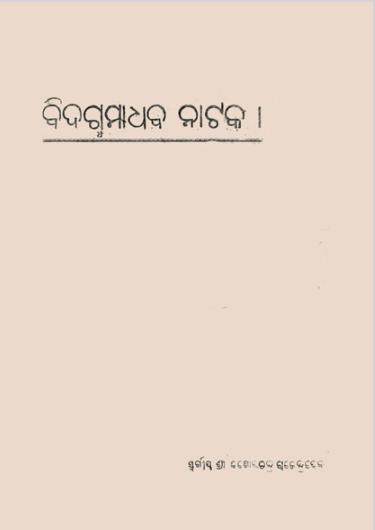In the annals of Odia literature, the early 20th century marked a significant shift in the presentation of local narratives through drama. One such pivotal work is Bidagdhamadhaba, penned by the esteemed playwright Kishore Chandra Deb and published in 1910. This play not only reflects the cultural ethos of Odisha but also serves as a medium to address various societal themes through its engaging narrative and dramatic performances.
Bidagdhamadhaba undoubtedly captivates its audience with a blend of humor and moral reflections. The narrative is centered around characters that embody various societal roles, infusing traditional Odia narratives with contemporary themes relevant to the audience of that era. The protagonist, Madhaba, is portrayed as an everyman navigating the complexities of love, societal expectations, and personal integrity. His interactions with other characters, including friends and family, create a rich tapestry of relationships that highlight the trials and tribulations of Odia society.
One of the remarkable features of Bidagdhamadhaba is its use of sub-drama—mini-narratives that intersperse the main plot. These sub-dramas are skillfully woven into the narrative, allowing the audience to witness parallel stories that, while seemingly unrelated, resonate with the overarching themes of the drama.
For example, one sub-drama might focus on the comedic antics of Madhaba’s friend, who attempts to woo a local beauty but finds himself in a series of blunders. This element of humor not only entertains but also serves to critique the often superficial nature of courtship in society. Such lighthearted threads bring balance to the more serious undertones of societal critique present in the main storyline.
Kishore Chandra Deb was known for his keen observation of societal practices, and Bidagdhamadhaba is no exception. The play explores themes of love, fidelity, honor, and the ever-present conflict between personal desires and societal expectations. Through Madhaba’s struggles, Deb illuminates the pressures exerted by society, particularly on the younger generation. The various conflicts faced by the characters act as reflections of the conflicts prevalent in Odia society.
Additionally, the play faces various social norms head-on, particularly concerning issues like marriage and familial responsibilities. Characters grapple with their roles and the expectations placed upon them, allowing the audience to engage in introspection regarding their cultural values. This form of societal commentary positioned Deb as a progressive voice during his time, making Bidagdhamadhaba relevant even today.
Bidagdhamadhaba plays a crucial role in the evolution of Odia theater. It paved the way for future playwrights to explore not only the aesthetics of drama but also the deeper societal issues through engaging narratives and relatable characters. The humor interlaced with moral dilemmas offers a unique viewing experience, making the play a vital part of Odisha’s theatrical landscape.
Books Info
| Books name | Bidagdhamadhaba Nataka / ଵିଦଗ୍ଧମାଧବ ନାଟକ |
| Author | Kishore Chandra Deb, Tr. |
| No Of pages | 196 |
| Publisher | NA |
| Publication | 1910 |
| Printed At | The UItkal Sahitya Press |
| Distributor | NA |

